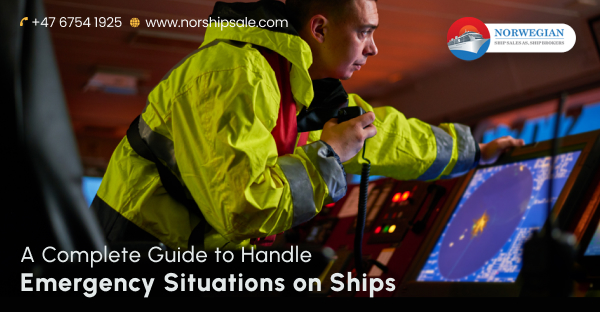When it comes to emergencies on ships, the situation must be handled cautiously. One should not jump to conclusions or make hasty decisions, as these can make the situation worse. Only with proper training, drill practice, and most importantly, being aware of the different types of emergencies, can one handle such precarious situations. As a result, a ship owner must be aware of the potential for emergencies on board a ship. Hence, if you are someone who is thinking of buying a cruise ship for sale, you can take a look at the guide here to learn about how to handle such situations.

On board the Ship’s Emergency Situation Guide
It is essential for seafarers to familiarize themselves with different emergencies. So, here is a comprehensive guide that explains everything.
General Alarm
When there is a serious emergency, ships will employ the universal emergency signal. The signal consists of seven or more small blasts, followed by one long blast on the ship’s whistle and the internal alarm system.
Within 24 hours following the arrival of every passenger, the crew will do a mandatory muster drill during which they will sound the General Emergency Signal. The drill’s goal is to inform passengers of what to do in case of a genuine emergency.
Fire Alarm
The crew should sound the alarm if they spot a fire aboard the vessel by hitting the closest fire switch or by shouting “FIRE FIRE FIRE” repeatedly and loudly. The constant ringing of the ship’s electrical bell or the constant honking of the horn works as the fire alarm signal.
The whistle or electrical bell must sound continuously for at least 10 seconds during the fire signal. However, the alarm bell for the fire signal rings continually in a majority of the vessels. The general alarm will sound three times, followed by three brief blasts of the ship’s whistle, once the master decides to discharge the crew from fire stations.
Ship Abandonment Signal
The signal to abandon ship is verbally communicated by the ship’s master to the station in command of the crew through the Personal Addressing (PA) system of the ship. This is done when the emergency on board grows out of control and the ship is no longer safe for the crew on board.
Onboard the ship, an abandon ship alert or the sound signal is applied by blowing the ship’s whistle more than six times in quick succession and once for a long duration. However, the alert that was raised is comparable to a general alarm, and everyone assembles at the emergency muster station, where the master or his stand-in Chief Officer issues a spoken order to depart the ship.
Overboard Signal for a Man
There have been several instances where a member of the ship’s crew or a guest fell into the water during rough seas. The ship’s man overboard warning signal is triggered when someone falls overboard.
The MOB alarm signal consists of three prolonged rings from the ship’s internal alarm bell that will alert the crew and three prolonged blasts from the ship whistle that will alert other ships in the area.
Engineers Call
In the event of an engineer’s call, all engineers present on board must make their way to the engine control room for further briefing.
Engine Room Flooding
A general alarm should be raised, and the Chief Engineer should be contacted right away in the event of the engine room getting flooded. A plan for emergency bilging from the engine room should be prepared in coordination with the Chief Engineer to stop further seawater intrusion.
CO2 Alarm
A fixed firefighting system that is installed in the ship’s cargo area also sounds a separate alarm when activated. The CO2-fixed firefighting system has a distinct audible and visual alert that distinguishes it from other ships’ alarms. The audio alarm should be distinguishable from other ships’ alarms by modifying sound pressure or sound patterns.
Cargo Hold Flooding
The Master must be notified right away in the event of a flooded cargo hold. Since the floods must be kept under control at all costs, raising a general alarm is necessary.
Pollution Prevention
If there is an oil spill, then the onboard equipment meant to prevent oil pollution must be used.
Conclusion
Whatever the scenario, keep the Master, Chief Engineer, and Officer informed at all times. If there are any additional emergencies, contact for help by phone or by activating the EMERGENCY CALL.

